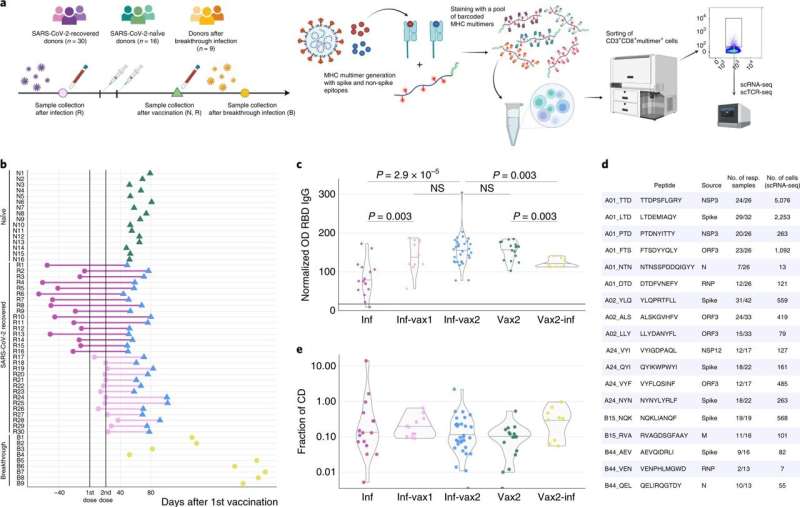Immune responses support COVID-19 vaccination regardless of when people were infected

Scientists at St. Jude Children's Research Hospital have evaluated how vaccination against, and infection with, SARS-CoV-2 affects the immune system. The results confirm that immunity by infection is not better than vaccination because both mount similar T-cell responses. In individuals who have already experienced COVID-19, getting vaccinated still expands T-cell memory and immune activation. A paper on the work appeared today in Nature Immunology.
Antigens are molecules that the immune system uses to recognize a threat such as an infection. Vaccinations and infections (in both the vaccinated and unvaccinated) expose the immune system to antigens. SARS-CoV-2 variants such as Delta and Omicron have added to the antigen landscape. Scientists studied how exposure to antigens before and after vaccination alters the immune response to the infection.
"If you've been infected, the vaccines still activate and expand your immune response in ways that can be protective," said co-corresponding author Paul Thomas, Ph.D., St. Jude Department of Immunology. "If you've been vaccinated and then get infected, the vaccine still helps protect you. Very importantly, it doesn't limit your ability to develop new immune responses to the strains that you're infected with. The type of immunity on the T-cell side that the vaccine gives you look very similar to, and in some ways superior to, the response that you get from infection."
The right tools to understand T cells
The study used data from the St. Jude Tracking Study of Immune Responses Associated with COVID-19 (SJTRC). SJTRC started in 2020, enrolling St. Jude employees and monitoring their vaccination and immune response to the virus.
"This creative and comprehensive T cell work emphasizes the importance of the prospective study design that allowed us to collect samples from participants before they had COVID-19," said co-corresponding author Joshua Wolf, Ph.D., M.B.B.S., St. Jude Department of Infectious Diseases. "A huge number of individuals at St. Jude gave their time and effort to make it possible."
The researchers used specialized techniques to determine which small pieces of virus that T cells identify in different people. Single-cell sequencing of the RNA and T-cell receptors (scRNAseq and scTCRseq) provided a window into T-cell activity and which T-cell receptors were most important. The researchers also created tools, including monoclonal T-cell receptor cell lines, to examine immune responses. These cell lines help identify different parts of the virus.
"We have a number of tools and techniques that allow us to analyze T-cell receptors effectively, to identify receptors that may be different, but basically have the same function," Thomas said. "We've gained an understanding of how this virus is evolving and mutating and how our immune responses adapt to these changes."
The benefits of vaccination
Results showed that the order of exposure (whether vaccination or infection came first) determined whether or not the immune response was geared toward the spike protein. mRNA vaccines against SARS-Cov-2 target the spike protein (a part of the virus). Vaccination after infection led to further expansion of spike-specific T cells, whereas breakthrough infections caused robust non-spike-specific responses that diversify T-cell memory.
"Properly understanding the T-cell response to COVID-19 infection and vaccination is really challenging, but it's essential to developing a long-term control strategy for this virus," Wolf said.
More information: Anastasia A. Minervina et al, SARS-CoV-2 antigen exposure history shapes phenotypes and specificity of memory CD8+ T cells, Nature Immunology (2022). DOI: 10.1038/s41590-022-01184-4





















